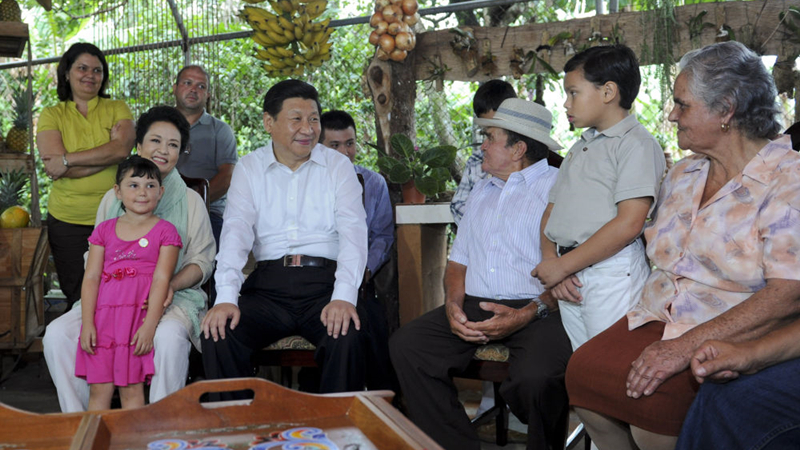Falling on Friday, the Mid-Autumn Festival has been observed by people of Chinese origin for thousands of years and is usually marked by family reunions, a full-moon viewing and the consumption of mooncakes.
This traditional festival has entrusted the Chinese people with their deepest nostalgia for home and their deepest attachment to their country since ancient times.
Reflecting his deep affection for the country and the people, Chinese President Xi Jinping has talked about nostalgia on many occasions.
From Fuping and Liangjiahe in northwest China’s Shaanxi Province, Zhengding in north China’s Hebei Province, to Fujian Province, Zhejiang Province, Shanghai and Beijing, Xi regards these places where he has worked as his “hometowns.”
‘Nostalgia means you will miss a place after you leave it’
During a state visit to Costa Rica in 2013, Xi visited the home of a farming family and talked about his experience in Liangjiahe.
“It is extremely rare for a president to speak so passionately and with such pride about being a farmer. Some people may downplay that aspect, but he does not. He emphasizes it,” said the Costa Rican farmer’s son.
In the late 1960s, Xi left Beijing for a village called Liangjiahe in an arid part of Shaanxi to work as a rural laborer and spent seven years in the countryside, working and living alongside farmers.
He was separated from his family, slept in cave dwellings, suffered from flea bites, and worked as hard as fellow villagers to tend crops, herd sheep, carry manure and haul coal.
Before leaving Liangjiahe, Xi expressed his appreciation to the people in Liangjiahe for their selfless acceptance and assistance. “I will never forget everything Liangjiahe has given me,” he said.
Whether it is at a small courtyard of a farmer’s house in Costa Rica, on the podium in Washington State in the U.S., or at the Global High Level Forum on Poverty Reduction and Development and the High-level Dialogue on Global Development, Xi has talked about his time in Liangjiahe.
In the spring of 1982, Xi volunteered to work at the grassroots level and moved to Zhengding, a poor county in Hebei Province.
For more than three years, Xi served first as deputy secretary and then secretary of the Communist Party of China (CPC) Zhengding County Committee and did a lot of pioneering work with the local CPC committee, planning strategies and laying a solid foundation for Zhengding’s development.
Recalling his experience in Zhengding during an inspection tour in Hebei in 2013, Xi said he grasped a direct understanding of how villagers feel through “being with comrades every day, talking, thinking and working together.”
Wherever Xi goes, he brings this sincere and simple feelings to the people.
“Don’t cut off true feelings because of long distances, don’t forget your true feelings because of a busy life and don’t ignore your true feelings because of the hustle and bustle of life,” Xi said at a Spring Festival gathering in 2017.
‘Seeing the place where you have worked can continuously develop is when you feel the happiest’
In 1988, Xi became the Party chief of Ningde Prefecture, one of the poorest regions in southeast China’s Fujian Province at the time. During the two years of working there, Xi visited 123 of the 124 townships, including three of the four without access to paved roads. Xiadang, a township nestled deep in the mountainous area of Shouning County, was one of them.
Xi visited Xiadang three times, and personally directed poverty relief in the remote town.
It took Xi about three hours by vehicle and two hours on foot along the rugged mountain paths to reach the township during his first visit.
Xi decided it was essential to focus on accessibility for the area to take off. Work began on a highway just months after his first visit, and the road into Xiadang opened in January 1991.
The second visit came on July 26, 1989, after the county was hit by its worst floods in a century. Xi sent condolences and post-disaster reconstruction funds to the people affected by the floods. He visited the township for a third time on August 7, 1996, to investigate and direct poverty alleviation work.
Thanks to poverty alleviation efforts, tremendous changes have occurred in Ningde.
When inspecting Fujian in March 2021, Xi met several tourists from Shangrao, Jiangxi Province, who said it took them only 22 minutes to take the train to Wuyi Mountain, a famous summer resort in Fujian.
“Seeing the place where you have worked can continuously develop is when you feel the happiest,” he once said.
Hosting a banquet to welcome guests who are gathering in Hangzhou to attend the opening ceremony of the 19th Asian Games, Xi warmly recommended Zhejiang to the guests.
“I once worked in Zhejiang Province for quite a few years. Committed to reform and opening-up, the province is now fast-tracked toward high-quality development,” Xi said, adding that it is building a demonstration zone for common prosperity, and has become a pioneer in Chinese modernization.
“My job is to serve the people. It is very tiring, but also very fulfilling,” Xi said, though knowing that governing such a huge country requires a strong sense of responsibility and hard work.





